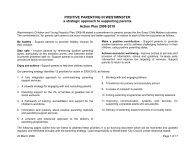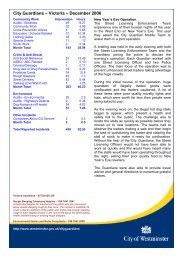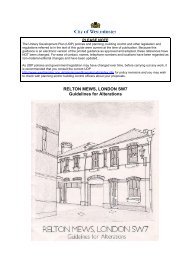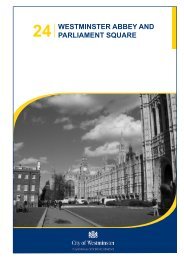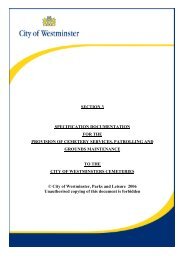Statement of Licensing Policy (2008) WCC - Westminster City Council
Statement of Licensing Policy (2008) WCC - Westminster City Council
Statement of Licensing Policy (2008) WCC - Westminster City Council
You also want an ePaper? Increase the reach of your titles
YUMPU automatically turns print PDFs into web optimized ePapers that Google loves.
consequent <strong>of</strong> this movement at 23:00 would be serious. Policies STR1 TAW2 and PB2and MD2 are intended to be strict, and will only be overridden in genuinely exceptionalcircumstances. However, the <strong>Licensing</strong> Authority will not apply these policies infl exibly.It will always consider the individual circumstances <strong>of</strong> each application; even wherean application is made for a proposal that is apparently contrary to policy (revisedGuidance, paragraph 13.34).2.4.3 It is not possible to give a full list <strong>of</strong> examples <strong>of</strong> when the council may treat anapplication as an exception. However, in considering whether a particular case isexceptional, the <strong>Licensing</strong> Authority will consider the reasons underlying the StressArea special policies on cumulative impact.2.4.4 The <strong>Licensing</strong> Authority will not consider a case to be exceptional merely on thegrounds that the premises have been or will be operated within the terms <strong>of</strong> theconditions on the licence, or that are or will be generally well managed. This isexpected in the conduct <strong>of</strong> all licensed premises.2.4.5 The <strong>Licensing</strong> Authority’s policies, in relation to the Stress Areas, are directed at theglobal and cumulative effects <strong>of</strong> licences on the area as a whole. Therefore, a caseis most unlikely to be considered exceptional unless it is directed at the underlyingreason for having the policy. Exceptions to the Stress Area policies to refuse certaintypes <strong>of</strong> applications must be for genuinely exceptional reasons. Thus any list <strong>of</strong>circumstances where exceptions may be granted is not defi nitive. One example mightbe a proposal to transfer an operation from one premises to another, where the sizeand location <strong>of</strong> the second premises is likely to cause less detrimental impact andwill promote the licensing objectives. In order for this to be treated as a considerationjustifying an exception to policy, the council will need to be satisfi ed that the necessarylegal mechanisms are in place to ensure that the original premises licence will ceaseto be operable and cannot be transferred once surrendered. In considering whetherthere is likely to be less detrimental impact, the <strong>Licensing</strong> Authority will consider theactual operation <strong>of</strong> the premises which it is proposed should close, and it will takeinto account any future proposals which would affect the continued operation <strong>of</strong> thosepremises. Another example would be the substitution <strong>of</strong> existing licensable activity atthe premises with licensable activities which would have less impact on the area andwould be more likely to further the licensing objectives. Similarly, the reduction in thecapacity <strong>of</strong> a premises or a reduction in hours <strong>of</strong> operation might be a reason for anexception to policy. The police have found the reduction in capacity to be a provenmethod <strong>of</strong> promoting the licensing objectives in relation to the prevention <strong>of</strong> crime anddisorder.43





